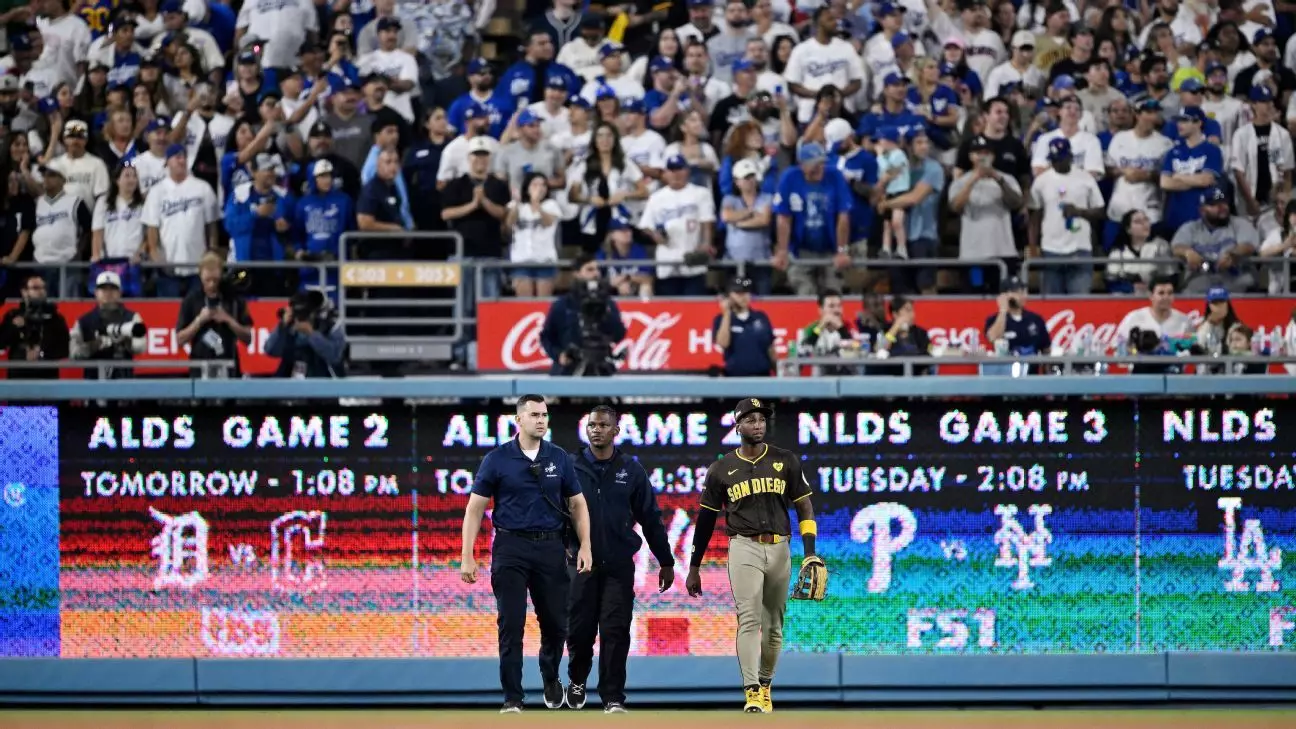In a moment that will not soon be forgotten by those who witnessed it, Game 2 of the NLDS between the Los Angeles Dodgers and San Diego Padres devolved into chaos in the bottom of the seventh inning. The combination of passionate fans, fierce rivalry, and on-field incidents culminated in a scene where close to two dozen security guards were called to action, lining the foul lines of Dodger Stadium to restore order. Such occurrences highlight not only the intensity of Major League Baseball’s playoff atmosphere but also the thin line between competitive spirit and outright disorder.
Provocation and Reaction
The inciting incident began earlier in the game with a playful interaction between San Diego Padres left fielder Jurickson Profar and the Dodger fans. In the first inning, Profar undoubtedly relished the moment when he foiled Mookie Betts’ home run attempts, reaching into the stands to snag a ball and flaunting it back to the crowd. However, as the game progressed, that lighthearted moment turned into an escalation of tensions. Profar’s subsequent confrontation with umpires after dodgeballs were hurled in his direction served to further ignite the already fiery atmosphere, drawing all of the Padres’ players and their manager onto the field in defense of their teammate.
As the game reached its boiling point, the involvement of fans became abundantly clear. Objects were thrown onto the field, not only putting players at risk but also raising questions about fan conduct during high-stakes games. The throwing of projectiles, particularly in the context of a celebrated sporting event, illustrates a disconcerting trend of spectators crossing the lines of acceptable behavior. The bounds of passion can easily give way to recklessness, blurring the line between spirited support and outright hostility.
At the core of the conflict was a poorly executed pitch by Dodgers starter Jack Flaherty, which struck Fernando Tatis Jr. In a sport where physicality and intimidation can decisively alter game flow, this incident ignited a chain reaction. Flaherty’s subsequent apology did little to quell tensions, particularly after a heated exchange with Manny Machado. These confrontations not only triggered personal feuds but also reverberated through the stadium, prompting the fans to react in an alarming manner.
Consequences of a Tense Rivalry
As is often the case in high-energy rivalries, emotions ran high, and rationality fell by the wayside. The nine-minute delay, compelled by unruly fans and growing hostility on the field, served as a stark reminder of how quickly competitiveness can segue into chaos. The outcome of such incidents often extends beyond the diamond, involving league officials, disciplinary actions, and potential repercussions for both teams.
In an era when sportsmanship is championed, it remains essential to consider the larger implications of unruly behavior in the stands and on the field. The events at Dodger Stadium underscore how passion for the game, though celebrated, can spiral out of control, prompting an essential dialogue about the conduct expected from players and fans alike during the thrill of postseason play.


Leave a Reply